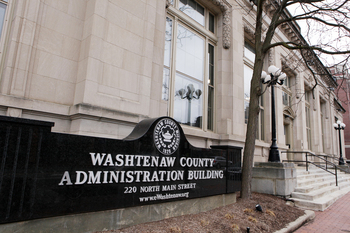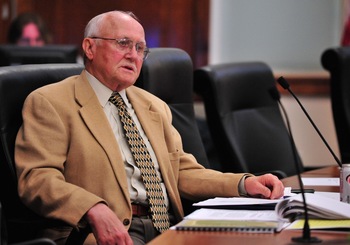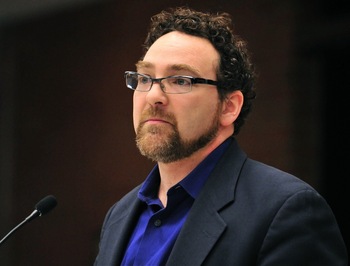In order to cover $148 million in long-term debt from retiree health benefit costs for its employees, Washtenaw County is considering borrowing about $345 million that it would pay back over the next 25 years.
Bonding for the debt is projected to save the county $112.5 million over that 25 years, according to an analysis presented to county officials Thursday night by Municipal Financial Consultants Incorporated.

AnnArbor.com file photo
Those new union contracts have allowed the county to begin vetting the idea of bonding to cover pension costs, as the retirement plans were closed for new hires during the negotiations. The county’s pension fund has now been closed - a requirement for the body to consider bonding for that large debt.
Thursday night the board began vetting the idea after a presentation by John Axe of Axe and Ecklund, the lawyer on the county’s bond counsel.
“This is a brand new type of bond,” Axe said. “No one has ever issued these obligations before in Michigan. As of right now, no one has yet had approval by the Michigan Department of Treasury.”
The state requires municipalities to have a AA bond rating in order to bond for retiree pension costs. Washtenaw County has a Aa1 Moody’s rating and a AA+ Standard & Poor rating.
“I’m satisfied you’re doing your job,” Axe said to the Board of Commissioners and county staff. “If I didn’t think you could pay these bonds back I would not be here.”
The ability of municipalities to bond for their long-term liabilities in their retirement funds was made possible by a law signed into effect in October 2012.
County administration directed Axe’s firm to begin evaluating the measure in November 2012, though the intent of the county to consider bonding for the debt was not publicly discussed at the Board of Commissioners until mid-April.

Wes Prater
Ryan J. Stanton | AnnArbor.com file photo
The weight of the proposal before the board even drew former county Commissioner Wesley Prater to the meeting, who commented on the proceedings before and after the discussion.
“We’re talking about a large amount of money that our citizens and taxpayers are responsible for,” Prater said. “I hope we don’t rush through these decisions and then feel sorry for them afterwards.”
Prater said the county got itself into the situation of having such a large unfunded liability for its retirement plans because of a lack of scrutiny - and he said he now worries that there’s a similar lack of scrutiny over bonding to pay for the debt.
The county first established a trust fund to provide health care benefits for retired county employees in 1948 - the Voluntary Employee Beneficiary Association.
Commissioner Conan Smith, D-Ann Arbor, said the county has always made its actuarial contributions to its retirement funds.
“Our unfunded liability is not because of irresponsibility on behalf of the government,” Smith said. “We have always been fiscally responsible.”

Conan Smith
Ryan J. Stanton | AnnArbor.com file photo
The county must wait on an actuarial report on its staff to be issued this June before the bond amount needed to fully fund the debt can be determined. For the purposes of the report Axe presented Thursday, that amount was estimated to be $345 million.
Axe supplied a timeline of the steps that would be needed to have bonds issued this year:
- May 15 Ways and Means meeting of the board: Resolution stating notice of intent, bond resolution and continuing disclosure resolution up for first approval
- June 5: Resolution stating notice of intent, bond resolution and continuing disclosure resolution up for final approval
- June 9: Notice of intent filed in AnnArbor.com
- June: Trust fund boards approve actuarial reports
- July 10: Ways and Means meeting of the board: Resolution of the bond plan first approval; following full board meeting: Resolution of the bond plan final approval
- July 24: Receive bond rating
- July 25: 45-day referendum period expires
- July 26: File for approval from the Michigan Department of Treasury
The majority of the savings by issuing bonds to cover the debt would be felt by the county within the first five to 10 years.
The difference between the county’s payment to its retirement fund and the bond payment would be a savings of $12.7 million in 2014 alone.
Commissioner Dan Smith, R-Northfield Township, questioned why the county needed to move forward so quickly with the bond proposal.
“All of the analysis that has been done on how this has been done financially are based on current expectations on interest rates,” Axe said in response. “It’s up to the client to decide how quickly to go.”
The Board of Commissioners has the power to issue bonds as general obligation limited tax funds without voter approval. Those bonds could only be paid for using money that already comes into the county’s hands through revenue, state reimbursements or taxes levied at already existing rates - which are at their maximum, Axe said.
However, should the county decide to request the voter’s permission to issue bonds as non-limited funds, the county would be able to levy an additional tax at any amount to cover its costs.
Commissioner Ronnie Peterson, D-Ypsilanti and Dan Smith expressed interest Thursday in taking the bonding issue to voters anyway to get their consent, even though they weren’t interested in levying additional taxes.
Several of the commissioners were initially concerned about pension obligation bonds - as a similar move heavily contributed to the debt situation incurred by the City of Detroit.
Axe explained Detroit issued certificates of participation to cover its retiree trust fund costs - but failed to close the retiree benefit plan and so employees continued to enroll. The city also undershot its estimate for covering its costs by about $300 million, Axe said.
Commissioner Felicia Brabec, D-Pittsfield Township, asked Axe how the county can be sure that it won’t underfund its debts by bonding too low.
“Pay close attention to the actuarial reports,” Axe said.
The amount of money the county would borrow to fully fund the pension costs is heavily dependent on actuarial reports that project based on historical data how long people will live and how much the county will be responsible for paying in health care costs.
Commissioner Rolland Sizemore Jr., D-Ypsilanti Township, said he would like to use business students from the University of Michigan and Eastern Michigan University on a pro bono status instead of hiring an outside firm to do an independent review.
Board Chairman Yousef Rabhi, D-Ann Arbor, said he would like to schedule additional means to engage the public in the discussion on bonding for the debt - including an informal press conference within the next two weeks, a presentation to the public between May 15 and June 5, and developing a pamphlet that will be available at county buildings and libraries.
The issue will also be on the Board of Commissioners’ agenda for its meetings in May, June and July. Rabhi encouraged the public to attend and give their comments on the process.
Amy Biolchini covers Washtenaw County, health and environmental issues for AnnArbor.com. Reach her at (734) 623-2552, amybiolchini@annarbor.com or on Twitter.